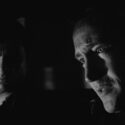 I remember reading IN COLD BLOOD as a teen. My interest was spiked by a review of THE EXECUTIONEERS SONG, where the reviewer suggested that Truman Capote’s best seller was a better piece of writing because, Capote had skin in the game. Norman Mailer it was said, had no sexual attraction to his protagonist and as such, the story was less compelling. I thought this was both idiotic and irrational. The two are different things. Capote’s book and the subsequent film, are studies in both post war youth and said youth rampant disaffection with their society. Robert Blake and Scott Wilson play as Perry Smith and Dick Hickock, who murdered four members of the Clutter family in Kansas during a botched robbery. Both were from normal backgrounds, sprinkled with jail time and then an absence from society. They were apprehended and put on trial. This trial began Capote’s interest but is upended in the film version of IN COLD BLOOD.
I remember reading IN COLD BLOOD as a teen. My interest was spiked by a review of THE EXECUTIONEERS SONG, where the reviewer suggested that Truman Capote’s best seller was a better piece of writing because, Capote had skin in the game. Norman Mailer it was said, had no sexual attraction to his protagonist and as such, the story was less compelling. I thought this was both idiotic and irrational. The two are different things. Capote’s book and the subsequent film, are studies in both post war youth and said youth rampant disaffection with their society. Robert Blake and Scott Wilson play as Perry Smith and Dick Hickock, who murdered four members of the Clutter family in Kansas during a botched robbery. Both were from normal backgrounds, sprinkled with jail time and then an absence from society. They were apprehended and put on trial. This trial began Capote’s interest but is upended in the film version of IN COLD BLOOD.
 Richard Brookes take is much more of a neo noir, character study. His lens is focusing on the two felons. Capote did this also but Capote digging of the Clutter family, is all but annexed. Instead we have Dick and Perry, or Perry in Capote’s world. Their singular personality is less prevalent in the personalities onscreen here. More we get a collective personality. Brookes was the great documenter of youth angst and youth engagement. From THE BLACKBOARD JUNGLE to CAT ON A HOT TIN ROOF, he understood the pieces that created disaffection and disturbance. Aided by Conrad Hall stunning cinematography, it has framed them as two men submerged in a complex series of issues. From their mental health cascading in prison and various emotional maladies. Brookes film constructs this brilliantly, passionately, with motivation and menace. One scarred by war and the other by normalcy levels you. This is the problem of looking at the work and the interpretation for me. The two works are completely different, yet the same.
Richard Brookes take is much more of a neo noir, character study. His lens is focusing on the two felons. Capote did this also but Capote digging of the Clutter family, is all but annexed. Instead we have Dick and Perry, or Perry in Capote’s world. Their singular personality is less prevalent in the personalities onscreen here. More we get a collective personality. Brookes was the great documenter of youth angst and youth engagement. From THE BLACKBOARD JUNGLE to CAT ON A HOT TIN ROOF, he understood the pieces that created disaffection and disturbance. Aided by Conrad Hall stunning cinematography, it has framed them as two men submerged in a complex series of issues. From their mental health cascading in prison and various emotional maladies. Brookes film constructs this brilliantly, passionately, with motivation and menace. One scarred by war and the other by normalcy levels you. This is the problem of looking at the work and the interpretation for me. The two works are completely different, yet the same.
 DISC
DISC
The 4K restoration needs a little discussion. Well actually a little chat to be fair. I think there is a slight frame issue. This is to say that the frame feels at issue to other releases. The frame feels or felt off centre. Shifted to the right slightly. It might be me and to be fair, it could be an issue with my DVD, that I compared it to, and which seemed to be slightly shifted to the left.
 EXTRAS
EXTRAS
I disregarded the interviews, which though appears nice, are functional. The real greatness comes from the excellent, from the period pieces. These reveal more of Capote then the film but that is valuable. Chris Fujiwara essay however, is the best thing on and in the set. Fresh, intelligent and explores the events, the interpretation from Capote and then the next layer from Brookes. He also places Brookes into his place, as a great film maker. Finally, I need to say that the interview that discusses the menacing jazz score by Quincy Jones, is really educational.
SPECIAL FEATURES
New 4K digital restoration, with 5.1 surround DTS-HD Master Audio soundtrack on the Blu-ray
New interview with cinematographer John Bailey about director of photography Conrad Hall’s work in the film
New interview with film historian Bobbie O’Steen on the film’s editing
New interview with film critic and jazz historian Gary Giddins about Quincy Jones’s music for the film
New interview with writer Douglass K. Daniel on director Richard Brooks
Interview with Brooks from a 1988 episode of the French television series Cinéma cinemas
With Love from Truman, a short 1966 documentary featuring novelist Truman Capote, directed by Albert and David Maysles
Two archival NBC interviews with Capote: one following the author on a 1966 visit to Holcomb, Kansas, and the other conducted by Barbara Walters in 1967
Trailer
English subtitles for the deaf and hard of hearing
PLUS: An essay by critic Chris Fujiwara




